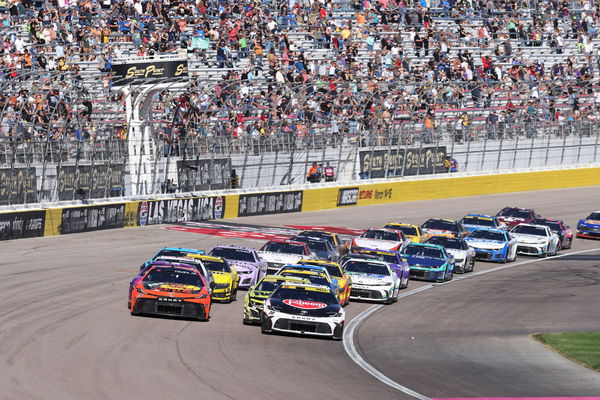
Imago
LAS VEGAS, NV – OCTOBER 20: Martin Truex, Jr. 19 Joe Gibbs Racing Bass Pro Shops Toyota and Christopher Bell 20 Joe Gibbs Racing Rheem Toyota lead a group of cars across the start line during a restart of the NASCAR, Motorsport, USA Cup Series South Point 400 race on Sunday, Oct. 20, 2024, at the Las Vegas Motor Speedway in Las Vegas, Nevada. Photo by Marc Sanchez/Icon Sportswire AUTO: OCT 20 NASCAR Cup Series South Point 400 EDITORIAL USE ONLY Icon1442410205177

Imago
LAS VEGAS, NV – OCTOBER 20: Martin Truex, Jr. 19 Joe Gibbs Racing Bass Pro Shops Toyota and Christopher Bell 20 Joe Gibbs Racing Rheem Toyota lead a group of cars across the start line during a restart of the NASCAR, Motorsport, USA Cup Series South Point 400 race on Sunday, Oct. 20, 2024, at the Las Vegas Motor Speedway in Las Vegas, Nevada. Photo by Marc Sanchez/Icon Sportswire AUTO: OCT 20 NASCAR Cup Series South Point 400 EDITORIAL USE ONLY Icon1442410205177
The NASCAR garage knows cancer as the opponent that never clocks out. When seven-time champion Jimmie Johnson faced basal cell carcinoma in 2017, he raced at Dover between biopsy and surgery, proving resilience isn’t just for checkered flags. His tweet cut straight to the chase. “Wear sunblock, kids. I’ve spent the morning having basal cell carcinoma cut out.” Then there’s Sherry Pollex, Martin Truex Jr.’s partner, whose nine-year ovarian cancer battle unfortunately led to her demise in 2023 but ignited a legacy of advocacy through her Sherry Strong clinic.
Watch What’s Trending Now!
These stories wired NASCAR’s DNA: when crisis hits, the community responds faster than a pit stop. Samantha Busch, co-founder of the Bundle of Joy Fund, frames this ethos perfectly. “Early detection saves lives. We’ve seen it in our NASCAR family.” Her initiative, supporting fertility treatments for families and also participating in initiatives for cancer patients, mirrors NASCAR’s drive to turn personal battles into collective action. As another insider’s health update ripples through the sport, the tribe instinctively circles its wagons, proving yet again that the real victories happen off the track.
David Vrabel, the voice behind NASCAR’s beloved parody account @nascarcasm, shared a pivotal update. “WIFEY UPDATE: Penultimate immunotherapy infusion. White flag next time. Get checked.” His wife, Jeanne Vrabel, is battling ductal carcinoma in situ (DCIS), a non-invasive breast cancer detected early through microcalcification screenings.
WIFEY UPDATE: Penultimate immunotherapy infusion. White flag next time by. Get checked. pic.twitter.com/VnZ761X6Nn
— nascarcasm (@nascarcasm) August 13, 2025
According to the American Cancer Society, DCIS has a near 100% survival rate when treated promptly. Jeanne’s protocol included chemotherapy, radiation (which David cheekily called “no more microwaving” in March), and immunotherapy to prevent recurrence. Holly Cain, a motorsports journalist and breast cancer survivor, epitomized the community’s voice. “She has been amazing, strong and so inspiring throughout! Love to you guys!”
Cain’s own 2014 fight involved chemo, a stroke, and family trauma, making her support deeply personal. Jeanne’s resilience mirrors this spirit: her hair regrew into a “delightful pixie cut,” and she demanded, “GET ME TO THE TRACK” during recovery, blending medical grit with racing passion.
NASCAR’s response to illness isn’t just hashtags; it’s baked into the sport’s legacy. Martin Truex Jr.’s foundation funds pediatric and ovarian cancer care, while Tommy Baldwin Jr.’s 2024 remission announcement sparked survivor solidarity chains. As Vrabel signaled Jeanne’s “white flag” moment, fans and survivors mobilized like a pit crew on overtime, turning social media into a digital victory lane.
Fan reactions that define NASCAR’s heart
“You’ve got this! ❤️” This compact rallying cry distills NASCAR’s ethos: no one fights alone. When reporter Bob Pockrass shared his wife’s cancer diagnosis in 2025, similar messages flooded in from drivers like Kyle Busch and Bubba Wallace. The phrase’s power lies in its immediacy; it’s the verbal equivalent of a crew chief’s rally over the radio.
“Once wifey is done, we need a victory lane Celebration Interview casm.” Fans instinctively frame medical wins as checkered flags. This mirrors Jimmie Johnson’s 2017 Dover win, clinched between biopsy and surgery, where celebration blurred sport and survival. The demand for an interview mirrors post-race rituals, honoring Jeanne’s stamina as elite athleticism.
“I am going through chemo right now, cheering for your wife. She will be a stronger person after that!” Shared battles anchor NASCAR’s support web. When crew chief Tommy Baldwin Jr. announced remission in 2024, he ignited chains of stories from fans in treatment. This raw solidarity, “trust me, bro,” reveals how vulnerability becomes collective armor.
“As a person who battled cancer, I’m assuming it’s IVIG infusion… a life changer.” Immunotherapy expertise entered the chat. IVIG (intravenous immunoglobulin) boosts immunity post-chemo and is commonly used for DCIS 10. Such educated empathy reflects Sherry Pollex’s legacy: her advocacy demystified treatments for thousands.
“Appreciate your dedication. Miss seeing you’re at track action but hope to see you soon.” David’s absence underscored family-first sacrifice. When Mike Wallace paused racing in 2025 to honor his late wife, Carla (lost to ovarian cancer), fans similarly prioritized healing over horsepower. This message sees the person behind the persona, a core NASCAR value.


